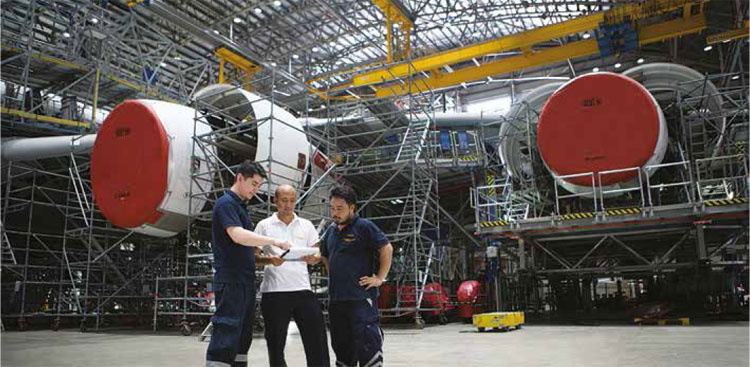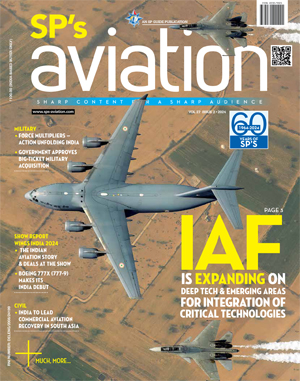INDIAN ARMED FORCES CHIEFS ON
OUR RELENTLESS AND FOCUSED PUBLISHING EFFORTS

SP Guide Publications puts forth a well compiled articulation of issues, pursuits and accomplishments of the Indian Army, over the years

I am confident that SP Guide Publications would continue to inform, inspire and influence.

My compliments to SP Guide Publications for informative and credible reportage on contemporary aerospace issues over the past six decades.
ONE-ON-ONE
Global Market Leader Marks 25 Years of Shaping The Industry
Even during this torrid Corona crisis, Lufthansa Technik continues to provide reliable services and fulfilment based on a solid network of global MRO operations in the Americas, EMEA and Asia Pacific and a vast network of subcontractors. “To fulfil the growing MRO demands in Asia and remain a key player in this environment, we have been regionalising our organisation to be closer to our customers and developing our offerings.” Gerald Steinhoff, Senior Vice President Corporate Sales Asia Pacific, Lufthansa Technik AG speaks to SP’s Aviation on their growth and plans for the future.

BUSINESS CURVE
As on today the business curve in commercial aviation is extremely dynamic.
SP’s Aviation (SP’s): How do you perceive the performance of business in the following sections of civil aviation?
a. Mainstream airlines’ operations?
b. Regional connectivity operations?
c. Business and General Aviation?
Gerald Steinhoff (Gerald): Let us focus on Asia Pacific. It is one of the fastest-growing markets in the world mainly pushed forward by Tourism, which plays an important role creating demand and growth and has a variety of strong economic impacts for many industries. Civil aviation is one. The APAC market is diverse; it varies from legacy carriers to a lot of LCCs and start-ups, subject to regional demands. MRO business mainly depends on airlines’ growth, while at the same time airline business has a tight correlation to economic performance of regional tourism- as for example air traffic passenger demand. How dynamic the business in commercial aviation is, can clearly be seen under the extraordinary current circumstances.
Regarding business and general aviation, the growing demand of corporate users and offerings of charter services have led to a significant business growth in recent years, such as Hong Kong and China. However, it requires a lot of infrastructure to support the business sustainability.
INVESTMENTS & INNOVATION
The MRO industry is highly competitive, especially in Asia. Singapore, Indonesia, Thailand and Vietnam are each expanding their own capabilities to compete with the more established providers in Hong Kong, Japan and even China.
SP’s: What is Lufthansa Technik doing to stay competitive and earn a piece of the Asian pie?
Gerald: As a global MRO market leader, we have prepared ourselves for all new engine types and aircraft types, especially for the new aircraft types like the Airbus A350 or the Boeing 777X. The APAC market is known to be extremely competitive and requires local presence and internal access to the market.
To fulfil the growing MRO demands in Asia and remain a key player in this environment, we have been regionalising our organization to be closer to our customers and developing our offerings. We have been continuously developing our regional set-up to further understand our customers’ needs and find the right solution for them. Through our regionalisation plans, we have literally become more diverse and multicultural. We encourage the intensive exchange with our customers - with sales representatives who are located in the respective countries and who facilitate the cultural and linguistic exchange. We are simply there where our customer is and we are ready whenever he needs us.
SP’s: What kind of innovations are you introducing in your services portfolio?
Gerald: We are well- positioned in the market with our AVIATAR suite. It offers a comprehensive data analytics solution for airlines - from the data pipe and a platform that digitizes maintenance data to realize benefits based on analytics and predictive tools.
“As a global MRO market leader, we have prepared ourselves for all new engine types and aircraft types, especially for the new aircraft types like the Airbus A350 or the Boeing 777X”
We also put great effort in expanding our portfolio services and are successful in the region with a number of special products and services that extend beyond commodities, which help our customers to adapt to the latest in-flight trend, overcome shop capacity constraints, improve on operation efficiency and save costs in different areas etc. A very good example is our Mobile Engine Services. It offers sustainable savings by optimizing Time On Wing (TOW) through tailored-made on-wing/on-site engine repair. Furthermore, we have developed a wide range of cabin modification solutions that we can offer to customize according to our customer’s needs.
As mobile communication is ubiquitous in Asia, in-flight connectivity is an important service feature for airlines. We provide as part of complete IFEC solutions in different partnerships, one of which is with Mahata Aero Teknologi, Lufthansa Systems and Inmarsat to provide our customers in the region our product L-connect. Last year, we have already concluded two contracts with local providers in Indonesia and China, we believe more countries will follow.
PRESENCE IN ASIA
You have seven facilities in Asia (China x 2, HKG x 1, Philippines x 1, Malaysia x 1, India x 1, Singapore x 1).
SP’s: What are your plans for the future?
Gerald: Asia is an emerging market with huge potentials for business opportunities. We will surely further expand in Asia, yet it also depends on the market development alongside the quality of economic growth under the current situation. We see that the future focus will be more on components and engines in Japan, Vietnam market, as well as China and India, which show the highest growth.
Seeing the importance of having local presence in Asia Pacific, we have expanded our footprint and developed a strong network across the region. Actually, we have seven Lufthansa Technik Group facilities and area sales head offices.
In Mainland China, we have Lufthansa Technik Shenzhen (LTS) that offers a broad range of products and services in the fields of composite materials (Airframe Related Components, ARC), component services, engine parts repair (Engine Parts and Accessories Repair, EPAR) and spare support for AOG and pooling. The above-mentioned Mobile Engine Services is a new product offered from LTS colleagues that comes with a broad spectrum of customised repair and maintenance solutions within APAC. In light of the current trend in orders, a significant investment program was launched to build up key technologies on new aircraft types.On top of that, we have already offered more than 3500 P/N for our component business and we are thrilled that LTS will become a Tier 1 shop for A350 components in APAC.
Not too far from Shenzhen, we have Lufthansa Technik Component Services Asia Pacific in Hong Kong, which is the headquarters for our component business in the region, hosting all customer service functions for Asia Pacific.
“We put great effort in expanding our portfolio services and are successful in the region with a number of special products and services that extend beyond commodities, which help our customers to adapt to the latest in-flight trend, overcome shop capacity constraints, improve on operation efficiency and save costs in different areas”
Our Lufthansa joint venture with Air China, Ameco in Beijing, is the largest provider of technical support services for aircraft in China. It specialises in the maintenance, repair and overhaul (MRO) of aircraft, their engines and components.
As one of the three main sales hubs of Lufthansa Technik, we have strategically set the headquarters of our APAC sales office in the heart of the region, Singapore, with a workforce of approx. 30 mainly active in sales activities for all company products and services.
Looking further down south, there is Airfoil Services Sdn Bhd (ASSB) in Malaysia specialised in the engine repair of Airfoils for High Pressure Compressors (HPC) and Low Pressure Turbines (LPT). This is our joint venture with MTU Aero Engines AG. ASSB is highly focused on research and development. It has recently initiated several repair development projects for new generation airfoils to increase its product portfolio in the near future.
Lufthansa Technik Services India (LTSI), in Bengaluru, a fully owned subsidiary of Lufthansa Technik AG founded in 2005 with up to 200 employees dedicated to delivering premium component support and maintenance services to customers especially in India and around the globe. Our future plan in India is to grow the existing footprint and further support our customers with the recent opening of AOG Desk is a proof of expansion of our service portfolio in LTSI.
In the Philippines, we have Lufthansa Technik Philippines (LTP), our joint venture with Philippine MacroAsia Corporation for the maintenance and overhaul of a large range of aircraft types. We are well-positioned for wide-body aircraft and our facility is heavily in demand. One of the major investment recently is the building of a new hangar at LTP allowing for growth of both its base and line maintenance business - expansion of line maintenance with an additional narrowbody bay, for base maintenance to capture new Airbus A350 and Boeing 777 market opportunities. It could lead to an approximately 20 per cent increment of LTP’s capacity. With the additional capacity, LTP will be able to better capture new business opportunities and have more flexibility when it comes to long-term perspectives.
As mentioned before, we also plan to further strengthen our efforts in providing an even wider portfolio of services, and continue looking into collaborating with more original equipment manufacturers (OEMs) as we do believe in the power of long-term cooperation with partners who are interested to create sustainable values along the chain. Last year, for example, our subsidiary Lufthansa Technik Shenzhen has signed cooperation agreements with Meggitt PLC and Honeywell for providing component MRO services for commercial aircraft in mainland China.
SP’s: Will you have full-service facilities everywhere or offer specialised maintenance in select cities?
Gerald: As mentioned, the Asia market requires local presence and internal access to the market. We are currently evaluating possibilities and market situations.
SP’s: Where are your next locations?
Gerald: It could be anywhere we see a chance for partnering with an attractive business model or even as a greenfield solution where we feel this is more feasible.
SP’s: Will you expand your current size of operations or you feel, you do have enough capacity to serve the Indian market now and in the future?
Gerald: We expect to see a steady growth in the global MRO business, therefore it makes sense to expand the current size of operations not only for the Indian market but for the entire Asia Pacific.

DIGITISATION
Digitisation has taken over many of contemporary means in the entire scheme of work, these days. It is impacting civil aviation big way.
SP’s: What kind of role do you foresee of Digitisation?
Gerald: Yes, it has a huge impact. Ideally, predictive solutions will reduce the overall cost of operation, reduce operational interruptions and increase the reliability of the fleet. The number of airlines using the latest big data solutions is limited but growing quickly. Many airlines worldwide are looking at such solutions, but the products of real predictive maintenance are limited. Many products are just providing digital results without a direct connection to maintenance actions. That is why our digital operations suite, AVIATAR, can be linked directly and automatically to fulfillment actions.
Data control is a key issue, because more and more OEMs restrict access to operational data for airlines, who own the data of their aircraft. This reduces the choices of airlines to cooperate with MROs, and other players in the market. We are not the only ones in the industry who think that this is not acceptable.
SP’s: How fool-proof it remains as the civil aviation is not allowed to accept nor forgive any errors?
Gerald: An aircraft, especially a new aircraft, produces vast amounts of data. Our unique digital suite AVIATAR translates data-driven findings into real-world instructions-and makes it possible to implement predictive maintenance, unprecedented failure analysis, and condition monitoring for systems and components like never before. It helps tech ops managers and trouble- shooters to improve transparency about the specific status of each aircraft in the fleets and avoid disruptions during operations. One of our visions is a seamless interface between the digital platforms and the physical fulfilment - with operational data being used to guide the repair process, and repair data being fed back to the predictive maintenance algorithms.
25 YEARS’ COMPLETION
Twenty Five Years’ journey is a decent timeline particularly when it belongs to the sector like aviation which is so much dynamic and evolving.
SP’s: As you complete 25 Years, can you take us through your journey since inception and the achievements till date?
Gerald: 25 years ago, Lufthansa Technik already took off as the industry’s most acknowledged independent maintenance, repair and overhaul provider who shaped the industry like no other companies since January 1995.
In order to provide flawless services and be of close proximity to our customers, we have been continuously growing with global expansion resulting in a powerful global network. Today we have more than 25,000 workforce worldwide across all our 35 subsidiaries and joint ventures (JVs) with the most recent establishment namely XEOS (JV between Lufthansa Technik and GE Aviation) and EME Aero (JV between Lufthansa Technik and MTU Aero Engines).
The evolution of Digital has altered how we live and work. No sector was spared including the MRO industry. To remain relevant and not to become obsolete, Lufthansa Technik took the digital transformation of the aviation industry to the next level that led to the birth of AVIATAR.
AVIATAR is an innovative and holistic platform that offers an extensive variety of digital products and services for MROs by combining multiple web-based apps in one single place.
We never stop moving forward. Throughout the years, we have grown our portfolio successfully to a point that we are able to provide nose-to-tail solutions for all aircraft, even the latest aircraft type, Boeing 777X.






